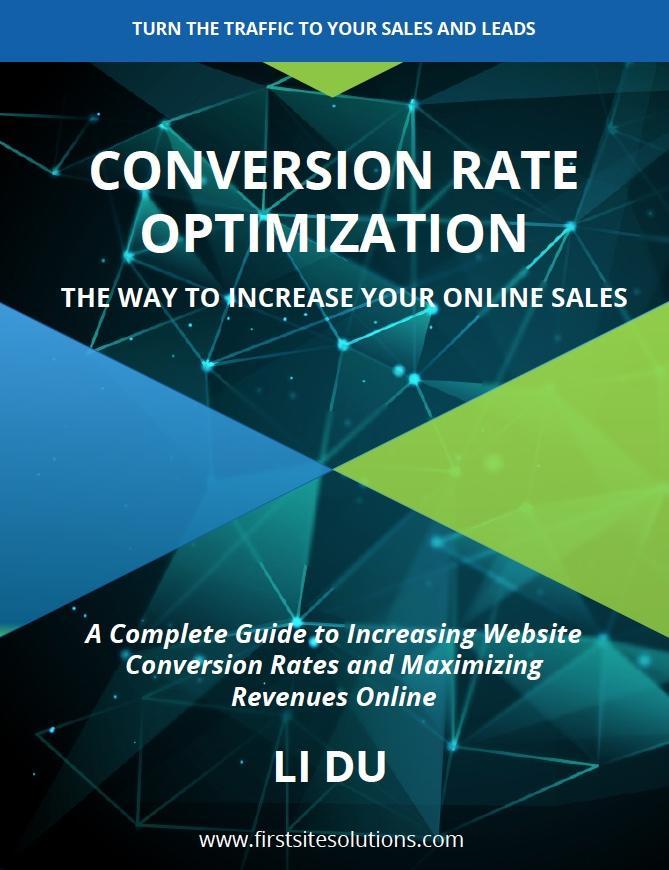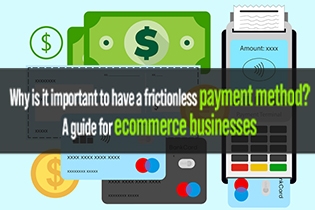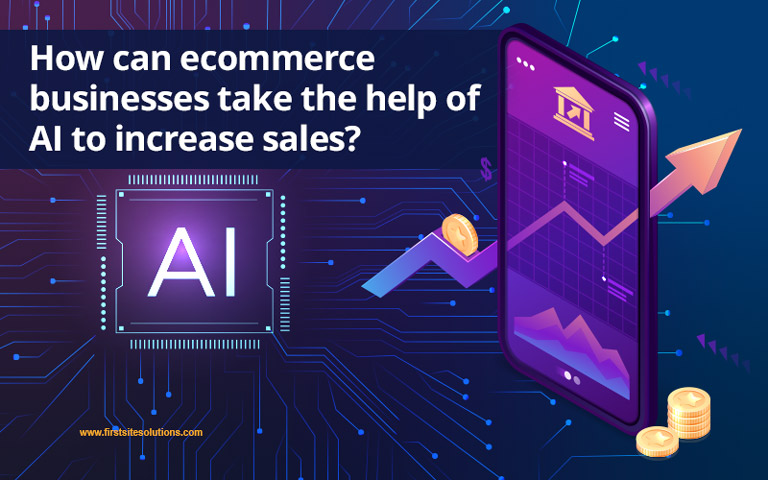
Ecommerce companies around the globe are using Artificial Intelligence (AI) to accomplish arduous tasks. From Google’s chatbots to home devices, AI has penetrated deep into our lives. At the same time, infusing this technology in ecommerce has revolutionized the digital shopping experience.
Google’s recent $500m purchase of the AI start-up DeepMind is one of the many acquisitions predicting a major AI revolution in the future. Along the same lines, major tech companies like IBM, Meta, and Yahoo have already given a clue that speaks for their focus on creating artificial intelligence as the new route to business growth.
The truth is, AI is highly significant for every individual involved in the corporate world. It all boils down to machines handling tasks that require manual input. It frees up our time and energy to fry the bigger fishes.
A recent study by Business Insider suggested that 85% of customer interactions will happen without a human operator by 2024. We have seen this coming true in the past year. This year, AI will bring a whole new tide of reformation in the eCommerce sector.
Here are some of the ways ecommerce companies can deploy Artificial Intelligence (AI) to increase sales:
Personalize the online shopping experience
Consumers often abandon ecommerce experiences because display results are irrelevant. AI enables ecommerce search engines to think like humans do.
When companies integrate artificial intelligence in their ecommerce portals, they can offer personalized and interactive buying experiences. It will allow them to view customer preferences and provide them with reliable shopping experiences.
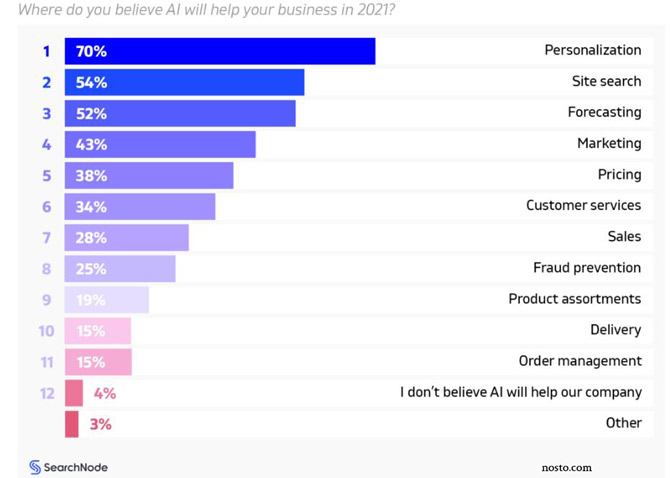
A US-based tech startup Clarifai is also trying to improve the ecommerce experience. Its work focuses on the visual elements of search. The website declares its software as “artificial intelligence with a vision.” The company is enabling developers to design smart apps. This empowers the companies to provide a customer-centric shopping experience. It uses an advanced video and image recognition system.
AI can help to deliver viable product suggestions that users like to view. AI will help to analyze purchase history, shopping carts, clicks, and search queries. All of these can help ecommerce brands to provide apt suggestions for additional purchases. This will make sense to the users, compelling them to purchase.
This will bring the following benefits for ecommerce retailers:
- Improved customer retention and profits
- Increased number of returning customers
- A personalized business mail campaign
- A personalized shopping experience for online buyers
AI technology has provided a competitive edge to companies. An excellent example is Pinterest’s recent update of its Chrome extension. It allows users to select an item in online photos. Next, they can ask Pinterest to provide similar items using the image recognition technique. Indeed, it is an amazing advancement!

Provide a personal touch with chatbots
Another popular application of AI in ecommerce is chatbots. These systems interact via text or voice. Consumers can speak to the device instead of typing their queries. Some of the best examples of AI chatbots include Slack and Facebook Messenger.
Consumer needs are rapidly evolving in this age. It has become quite daunting for online retailers to keep up with the changing technologies.
In this regard, chatbots are making waves of modifications in the customer experiences. A chatbot can actively take some responsibility that comes with running an online venture. It automates the order process and turns into an effective way of providing customer service.
Once you integrate a chatbot system into your shopping cart, it works for every customer who logs into your digital store. The more shopping carts your chatbot app supports, the chances of getting customers to go up.
AI chatbots can bring immense rewards for companies that receive international queries. It evaluates the language and dialect of the users, along with their past behaviors. Popular ecommerce websites like eBay and Amazon have implemented AI chatbots to deliver a convenient order placement system. Although there are several communication modes like emails and phone calls, online chat wins in terms of efficiency and speed.
Improve recommendations for customers
Brands can effectively scan through petabytes of data using artificial intelligence. It helps to predict customer behavior and offers helpful recommendations to them. This level of intelligence allows providing an efficient shopping experience for the consumers.
An AI-based technology company, Sentient Technologies, is allowing virtual shoppers to recommend products based on their prior shopping behavior. It has introduced Alexa Voice Shopping that allows you to scan through the best daily deals and place orders by using voice.
Starbucks is yet another name worth mentioning in this regard. The company uses AI to evaluate the collected data and deliver personalized suggestions. It recently launched “My Starbucks Barista.” It uses AI to enable customers to place an order via voice commands.
The algorithm in such programs uses a variety of data such as account information, prior purchases, third-party data, and contextual information.
These days, there is an increasing focus on hyper-personalization. This could become possible by learning genuine customer behavior and make predictions using vast amounts of data. If you are not using an AI system, we suggest you begin using a few and watch the results.
Manage inventories effectively
Efficient inventory management is all about keeping the right inventory level that fulfills the market demand without piling idle stock. AI’s predictive technology is making huge waves in ecommerce inventory management. Companies must address the issue of tracking quantities of demand and supply. This is applicable on both physical and ecommerce sites, both.
According to Forrester, omnichannel fulfillment is the top priority for 94% of the retailers. Good inventory management is the art of balancing between stocking enough to meet the demand without creating an excess inventory.
With artificial intelligence inventory management, ecommerce sellers can keep that line with precision, using smart recommendations and real-time data. Artificial intelligence inventory systems follow the trends over time. It allows sellers to uncover the seasonal trends and manage the supply chain in a better way.
Following are the three ways AI helps to optimize inventory management:
- Estimated time of arrival – Being able to communicate the delivery time to customers is increasingly valuable and necessary in the competitive age we live in. Companies like Amazon can offer guaranteed delivery windows.
- Plan inventory replenishment – Application of AI in inventory management can improve store inventory levels. It helps to evaluate consumer choices and shopping behaviors.
- Secure stock management – With the ever-evolving consumer patterns, it is no longer enough to use generic information. Stock levels must shift and react to the dynamically changing demands. Companies such as REI use predictive rules to access warehouse and in-store inventory.
This image shows all the tasks accomplished by AI at Amazon:
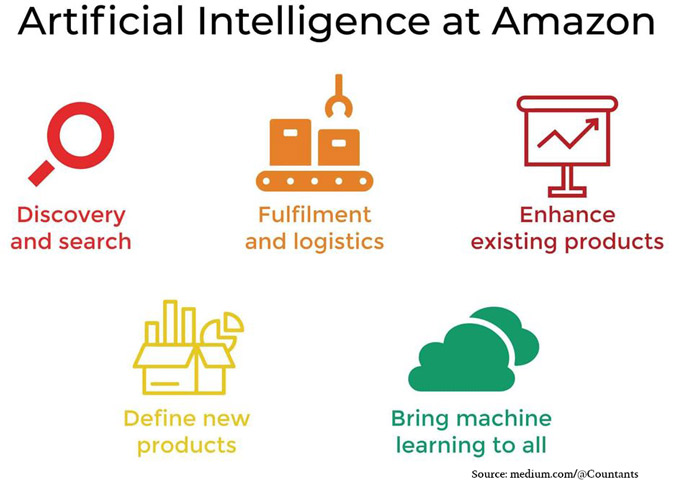
AI also makes it possible to design a flawless warehouse management system. Unlike human employees, AI robots can help to store or retrieve stocks round the clock. It conducts an immediate ordering of items when the company receives an online order.
JD.com is another massive retailer that shows how to make AI wonders happen. It launched the first automated warehouse, manned by 4 people who use robots and drones to complete 200 000 orders daily. By combining warehouse tech with AI, they can automate the overall order fulfillment process. They are using robots to pack, stack, and ship the merchandise.
Implements virtual assistants
All of us look for some online help when filling our carts.
Developments like Google Assistant and Siri have introduced us to the concept of speaking to a laptop, phone, or home appliances. Virtual assistants can help the customer to find the best product according to their needs.
AI assistants enable the users to tread across the product search journey. They recommend products to the users after evaluating their requirements. They can answer product questions which the user should ask before they make a purchase.
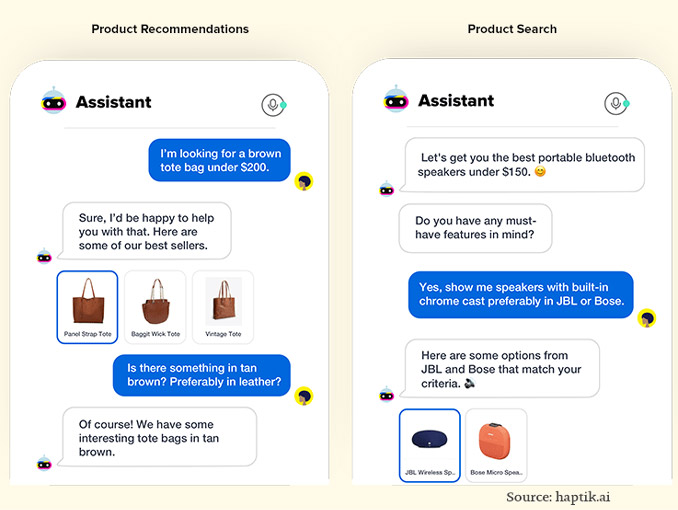
According to Forbes, conversational AI has escalated sales by 67%. It helps to attract new customers by evaluating their position in the buyers’ journey. Here are the following ways conversational AI can help ecommerce entrepreneurs to retain existing customers:
- Transactional messages from virtual assistants enable brands to continue creating conversations with customers through the purchase and post-purchase pathways.
- The 24/7 presence of virtual assistants help eCommerce companies to offer flawless customer service.
- Virtual assistants will also provide discounts, coupons, referrals, and rewards to loyal customers.
How the company treats customers through and post-purchases creates a massive difference in the consumers’ perception. AI assistants do not have fixed working hours. They also have multi-lingual capabilities to communicate with the customers.
Another example of AI application in ecommerce is using Alexa on Amazon Echo device. Customers can use this to discover local gigs for the upcoming weekend via StarHub. It arranges transport to and from the event through Uber or even orders dinner from Dominos.
Therefore, it is apt to state that virtual assistants create a significant impact on customers’ purchasing patterns. It helps to provide a creative opportunity for ecommerce retailers to seek benefits from.
Image classification
These days, retailers need to create a user-friendly and convenient process of online shopping to make shoppers happy. It often happens that buyers come across something, but it slips their minds. They cannot recall the name or where to find it.
Luckily, AI is changing the game for ecommerce owners. You can classify, interpret, and evaluate the images. AI helps to find what consumers are looking for easily. It enables people to search for images on Google. There are software platforms that enable ecommerce websites to optimize their photos for visual search.
For computers, an image is data representing a 2D matrix. It includes hundreds and thousands of pixels. There are different kinds of machine learning algorithms for image search. The following steps summarize how image search with machine learning works:
- The client uploads an image
- Preprocessing of the input image
- Extract the visual features of the uploaded photo
- Find similarity between extracted features and trained data
While things will get easy for the searchers, this could create problems on the other end of the search engines. Search engine marketers and SEO specialists primarily rely on heavy-text content to catch traffic. But now, search engine marketers, particularly those involved in the ecommerce industry, must place a higher emphasis on image optimization.
If you are not familiar with this feature, check out the Amazon mobile app. You can point your phone camera at something, and Amazon will spot it and put it into your cart.
Automated price management
Automated AI pricing solutions can help ecommerce entrepreneurs to cut the manual work. It gives you analytic software for price analysis that deploys a statistical model. It also has a couple of AI-integrated models to create algorithms that identify pricing patterns from data and predict prices based on that information.
When implementing AI in your ecommerce strategy, you can:
- Gain insight into ecommerce buying trends
- Spot data patterns to identify the price gaps and missed chances
- Predict prices according to data and patterns
There will be less need to track the prices of competitors. This will allow ecommerce retailers to determine product prices based on data from internal and external resources. These systems will also enable companies to implement new pricing strategies according to the goals you input into the system.
Final Thoughts
AI is making waves of changes in the ecommerce world. It allows retailers to study millions of interactions every day and target offers to every customer. Hence, ecommerce retailers should constantly look for marginal gains.
The use of artificial intelligence is nowhere to stop in the ecommerce world, you will witness it increasing with time. If a company aims to compete with the field giants, it is imperative to weave a flawless AI system in its operations. Ensure your online store has the best software at work, and you extract the most out of it!
Don’t forget to share your success stories with us!


